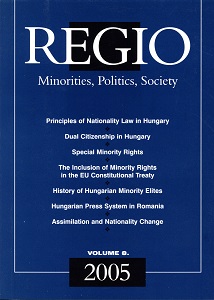Principles and practice of nationality law in Hungary
Principles and practice of nationality law in Hungary
Author(s): Judit TóthSubject(s): Law, Constitution, Jurisprudence
Published by: MTA Társadalomtudományi Kutatóközpont Kisebbsegkutató Intézet
Keywords: Hungary; nationality law; minorities
Summary/Abstract: The European enlargement has certain impact on nationality law. The case of Hungary may illustrate how migratory movements, Diaspora policy, national identity and legal regulation would be challenged by accession to, or fear of exclusion from, the wider European Union. This complexity can only be partially described through the short history of nationality policy, its major principles and legal practice. The term nation has been interpreted and inserted into regulation as part of the cultural/ethnic/linguistic community, and its substance is not definable by law. This is the basis of contradictions between laws and the Constitution. On one side, Art.6 of the Constitution refers to the kin-state’s responsibility for kin-minority living across the borders. However, the definition of membership in a minority or ethnic community is vague, and various preferential provisions legally discriminate others despite the fact that the state is party to dozens of international treaties. Furthermore, minorities living in Hungary form a distinct component of state power, in possession of subjective and collective rights according to the Constitution, although verification of their membership in the given ethnic or national entity cannot be defined in the same manner. Due to this logic, neither statistics on membership of minorities living in Hungary, nor hard data analyses of immigrants coming to and enjoying legal preferences in Hungary are available.
Journal: Regio - Minorities, Politics, Society - English Edition
- Issue Year: VIII/2005
- Issue No: 1
- Page Range: 21-39
- Page Count: 19
- Language: English

